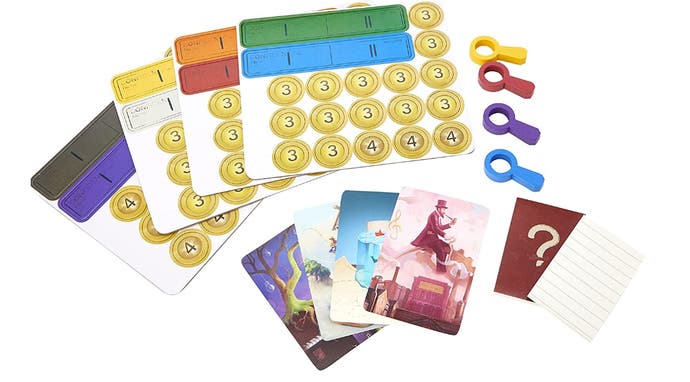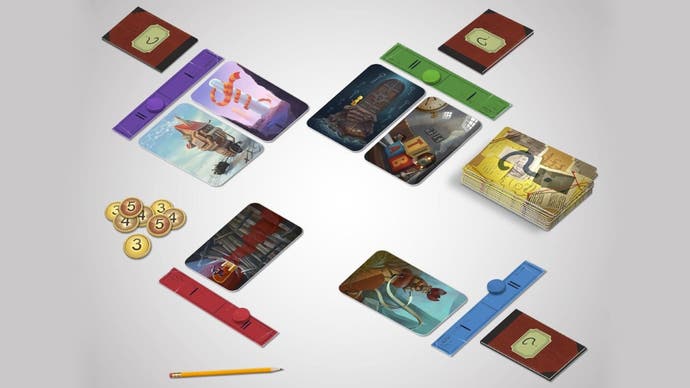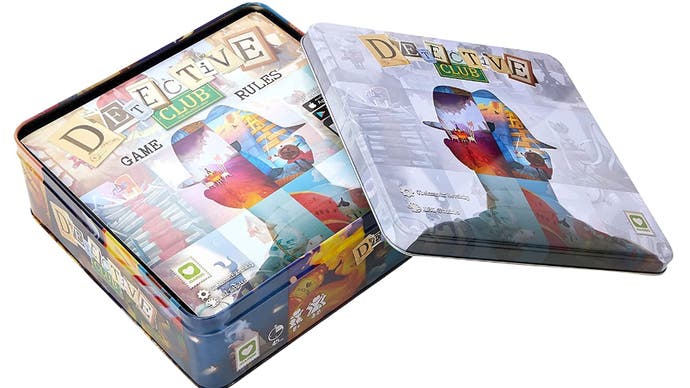Dicebreaker Recommends: Detective Club, the most creative lying experience you'll ever have
Prepare your poker face.
Dicebreaker Recommends is a series of monthly board game, RPG and other tabletop recommendations from our friends at our sibling site, Dicebreaker. If you enjoy these articles, maybe consider supporting them through their new memberships programme!
Over a decade ago, a little card game called Dixit was released. Featuring a deck of incredibly weird and beautifully illustrated cards, Dixit kind of revolutionised the tabletop industry – offering players a game where the ultimate goal wasn't winning, but telling a story.
As revolutionary and charming as Dixit was, and is, it's not especially fun to play. With no clear objective in place, playing Dixit feels rather pointless. Telling stories is fun and the cards are lovely to look at, but it gets very old, very quickly.
Since Dixit's release, however, there have been several Dixit-esque board games published - including the beloved spooky co-op game Mysterium and the more recent Detective Club.
The brilliant thing about Detective Club is that it takes the very basic concept of Dixit – using illustrated cards to communicate themes and ideas – and turns it into a game that's actually fun to play. Similarly to Dixit, players in Detective Club select and show illustrated cards to a group. Unlike Dixit, though, Detective Club pits players against each other in a test of intelligence and subterfuge.
Every round of Detective Club begins with one player taking the role of the clue giver. In this role, the player must look at their hand of illustrated cards and devise a theme that they think they'd be able to communicate using two of their cards. Once the clue giver has their theme, they write it in the back of a number of notebooks equal to the number of players minus one. Whoever receives this one, blank, notebook becomes the conspirator.
As the conspirator, the player will need to gleam what they think might be the clue giver's theme by examining the cards that everyone else plays in front of them. If the conspirator has absolutely no idea what the theme could be, they can always play cards that share similar elements to those played by the people who have gone before them. Starting with the clue giver, all players take turns to lay down a card in front of them that they think fits in with the given theme: or in the case of the conspirator, a card that they believe will go unnoticed.

Once all players have laid down two cards in front of them, the clue giver then reveals the theme to the table. After this revelation, each player besides the clue giver takes turns explaining exactly how the cards in front of them fit the theme. This is easily the best part of Detective Club because player success is not necessarily determined by whether they knew the theme or not.
The subjective nature of art and how we interpret it means that people aren't going to always agree on what an image represents. When you factor this very profound statement in alongside the fact that the illustrations featured on Detective Club's cards are extremely esoteric, it opens up a whole can of worms that players will very much enjoy shifting through.
Whether people believe your statement that you chose this card that has a goldfish on because it fits with the theme of youth is entirely unpredictable. You might have known what the theme was, you might have thought that this was a fantastic card. However, if people aren't buying what you're selling, then you could be falsely accused of being the conspirator.
Alternatively, you might be the conspirator and get away with it because you happened to have cards that fit the theme perfectly. Or you're just an amazing liar.

This is the main appeal of playing Detective Club – it has so many elements that make deducing the identity of the conspirator complicated. Sometimes it's relatively easy to figure out who didn't know the theme, whether that's because they're a bad liar or their cards just weren't working for them. But most of the time you'll be shifting through a jumble of possible culprits and end up picking the wrong person because you didn't agree with their arguments, they were acting suspiciously or their cards were crap.
Turning Dixit into a social deduction game was an amazing decision. Artistic theory is based on subjectivity; not everyone is going to agree with your opinion on an illustration. Using that as a jumping-off point for a game where people have to talk their way out of suspicion is genius and proves that Dixit-esque titles are always better when given stronger gameplay hooks.
If you're looking for a social deduction board game that's a little different from your werewolves and your The Resistances, then Detective Club will provide you with one of the most creative lying experiences you've ever had.


